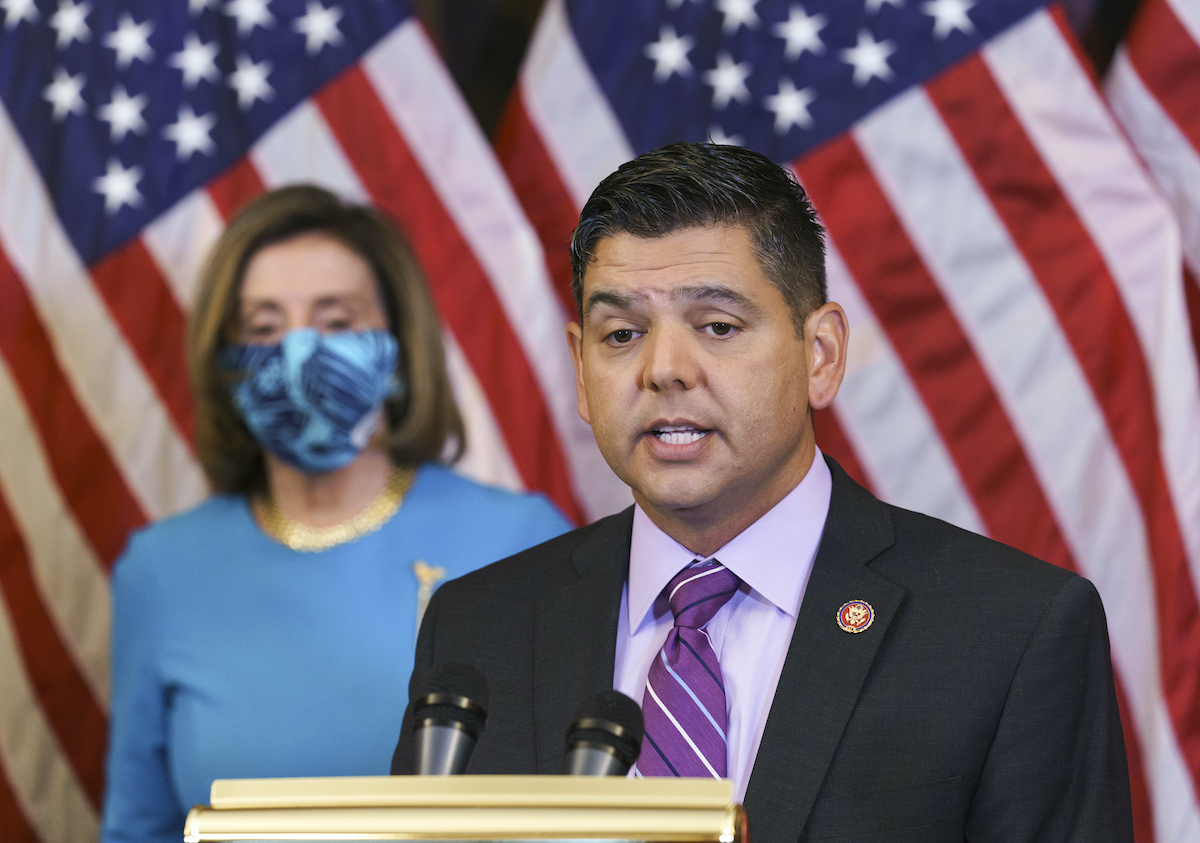

Rep. Raul Ruiz, D-Calif., chairman of the House Hispanic Caucus, joins Speaker of the House Nancy Pelosi, D-Calif., left, to discuss the upcoming vote on the American Dream and Promise Act of 2021, a bill to help reform the immigration system, at the Capitol in Washington, Thursday, March 18, 2021. (AP Photo/J. Scott Applewhite)
WASHINGTON, D.C. — In an interview with MSNBC on Saturday, the chair of the Congressional Hispanic Caucus, Rep. Raul Ruiz (D-CA), said he’s seeking a bipartisan solution for permanent immigrant relief.
"If we can just get 10 Senate Republicans to do the right thing…it would be a great benefit to our economy and our nation," @RepRaulRuizMD says of the Hispanic Congressional Caucus, which is working on a path to citizenship for immigrants. #CrossConnection #LatinoLandscape pic.twitter.com/ewwPvSH12B
— The Cross Connection with Tiffany Cross (@CrossConnection) October 16, 2021
“Of course, the big picture here is that we need ten Senate Republicans to help us pass” a list of standalone immigration bills, Rep. Ruiz told host Tiffany Cross.
Neither of the two Latino Republicans in the Senate, Marco Rubio from Florida and Ted Cruz from Texas, is a member of the Hispanic caucus. In fact, there are no Republican members in the Hispanic caucus, so it’s unclear where Ruiz hopes to find bipartisan support.
Some Latino Republicans in the House support a pathway to citizenship, but GOP caucus support for any bipartisan measure would likely come with the high price of increased border and immigration enforcement which greatly affect communities of color.
Regarding the Senate Democrats’ push to include some form of immigrant relief in the budget reconciliation agreement being negotiated on Capitol Hill, Rep. Ruiz indicated support for the immigrant parole proposal reportedly in the works for the Senate parliamentarian.
“We’re very disappointed on the parliamentarian’s decision,” said Rep. Ruiz when asked about the Democrats’ push to include citizenship in the budget deal. “Nevertheless, we’re going to continue to move forward on a proposal that will protect millions of individuals and add the amount of work permits that we have in order to help stabilize our labor force and our economy and to ensure the families are not separated [by] deportation.”
Scoop: The Congressional Budget Office is reviewing Democrats' latest immigration proposal for reconciliation. Could go to the Senate parliamentarian as soon as next weekhttps://t.co/Pbnv0JYsQ6 (no paywall)
— Ellen M. Gilmer (@ellengilmer) October 14, 2021
Immigrant parole is not a path to citizenship or even permanent legal status but a temporary status granting enrollees temporary protection from deportation and the ability to apply for a work permit on a case-by-case basis. Immigrant parole has been part of U.S. immigration law since the passage of the Immigration and Nationality Act of 1952 and has been implemented by presidents in both parties ever since, including the Mariel boatlift in 1980 which saw an influx of approximately 125,000 asylum seekers from Cuba.
Should the parliamentarian’s office approve immigrant parole in the budget reconciliation deal, a future president could order the Department of Homeland Security to unilaterally end the protections for migrant enrollees.
“Nonetheless,” writes Philip E. Wolgin, managing director for immigration policy at the Center for American Progress, “for the up to 7.1 million undocumented immigrants who could qualify —the vast majority of whom have never had status in the past— having a durable, long-term protection would be a positive change.”
***
Pablo Manríquez is the Washington correspondent for Latino Rebels. Twitter: @PabloReports



[…] parole does not create a pathway to citizenship, offering instead temporary permission to live, work, and travel to and from the United States for […]